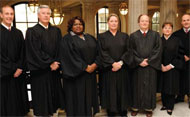3/18/2010
Louisiana Supreme Court: Phone Tips Justify Traffic Stop And SearchMotorists in Louisiana can be stopped and searched based on anonymous phone tips, the Louisiana Supreme Court ruled.

Police can pull over and search any motorist in Louisiana based on an anonymous phone call, the state supreme court ruled Tuesday. The case began at 6:30pm on Christmas Day in 2007. A motorist in Bossier Parish called to report a dark colored Ford Ranger pickup truck that "was going all over the road." Benton Police Officer Randall Matlock acted on the call and pulled over Trey Daniel Elliott, then 17, whose vehicle matched the description.
Police had no search or arrest warrant. They had no means of knowing whether the tip received was credible or not. Elliott's lawyers argued that, at the time, Officer Matlock had no independent knowledge that a crime was being committed and no way to know whether the 911 witness was credible. A district court judge agreed and threw out the stop as unlawful based on case law governing anonymous tips provided to the police. The court of appeals concurred. The high court, however, found that there is an exception to the Constitution when the case involves driving under the influence of alcohol (DUI).
"We are aware that a growing number of jurisdictions have concluded that drunken or erratic driving presents such an immediate risk of public safety that it constitutes an exception to the general rule that police may not act on anonymous tips unless they corroborate them in sufficient detail," Justice Greg G. Guidry wrote for the court. "In the present case, the witnesses were clearly citizen informants providing information about a crime as it was happening and not anonymous tipsters.... The dispatcher could reasonably infer from the circumstances that the caller was motivated by the desire to eliminate an immediate risk to public safety and was holding herself accountable for the information she provided by identifying herself, if not by name, then by the cellular phone from which she was calling."
The court ruled that the tip was not anonymous because of caller ID and that the information conveyed on the call provided reasonable suspicion for Elliott to be stopped and searched because it described traffic violations. After the stop took place, the caller arrived on the scene to verify the information. For that reason, the supreme court reversed the lower court's ruling and upheld the evidence obtained as a result of the stop. The court remanded Elliott's underage DUI case back to the district court for further proceedings.
A copy of the case is available in a 25k PDF file at the source link below.


